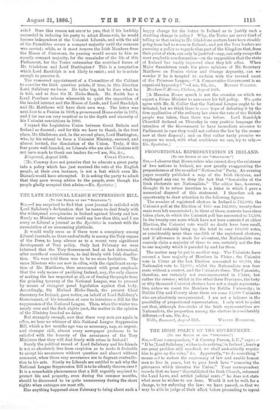THE LATE NATIONAL LEAGUE SUPPRESSION BILL.
[TO THE EDITOR OF THE " SPECTATOR."] SIR,—I am surprised to find that your journal is satisfied with Lord Salisbury's declaration that he means to deal firmly with
the widespread conspiracies in Ireland against liberty and law. Surely no Minister whatever could say less than this, and I am sorry so Liberal a journal as the Spectator is content with the enunciation of an unmeaning platitude.
It would really seem as if there were a conspiracy among Liberal journals, as there undoubtedly is among the Tory organs of the Press, to keep silence as to a recent very significant development of Tory policy. Only last February we were informed that the Tory Government had at last determined, after months of consideration, to deal firmly with Irish disaffec- tion. We were told there was to be no more hesitation. The same Minsters who are now in office, with the significant excep- tion of Mr. Matthews, then announced with great emphasis that the only means of pacifying Ireland, nay, the only chance of making the law respected at all, or of freeing the people from the grinding tyranny of the National League, was to proceed by means of stringent penal legislation against that body. Accordingly, Sir Michael Hicks-Beach, the present Chief Secretary for Ireland, gave notice, on behalf of Lord Salisbury's Government, of his intention at once to introduce a Bill for the suppression of the National League. Then, when the winter was nearly over and the dark nights past, the matter in the opinion of the Ministry brooked no delay.
But strangely enough, now that these very men are again in office, we hear no whisper of this National League Suppression Bill, which a few months ago was so necessary, nay, so urgent ; and stranger still, almost every newspaper professes to be satisfied with the honesty of the assurances of the Tory Ministers that they will deal firmly with crime in Ireland !
Surely the political record of Lord Salisbury and his friends is not so absolutely free from suspicion as to make it desirable to accept his assurances without question and almost without comment, when those very assurances are in flagrant contradic- tion to his acts. Surely we Liberals are entitled to ask why the National League Suppression Bill is to be silently thrown over P It is a remarkable phenomenon that a Bill urgently required to protect life and property, even during the summer months, should be discovered to be quite unnecessary during the short nights when outrages are most rife.
Has anything happened since February to bring about such a happy change for the better in Ireland as to justify such a startling change in policy ? Why, the Tories are never tired of telling us that owing to Mr. Gladstone matters have been steadily going from bad to worse in Ireland ; and yet the Tory leaders are pursuing a policy as regards that part of the Kingdom that, from their point of view, can only be justified—nay, can only escape the most emphatic con demnation—on the supposition that the state of Ireland has vastly improved since they left office. When Major Saunderson reads the pious opinions of Mr. Secretary Matthews on Fenian virtue and Orange depravity, can we wonder if he is tempted to exclaim with the revered saint of the Primrose League,—" A Conservative Government is an [A Mansion House speech is not the occasion on which we expect a Prime Minister to announce his full policy. We quite agree with Mr. R. Collier that the National League ought to be defeated, but we think there is more hope of defeating it by the firm application of the ordinary law since the vote of the British people was taken, than there was before. Lord Randolph Churchill declared on Thursday in very positive language the intention of the Government to have immediate recourse to Parliament in case they could not enforce the law by the means now at their disposal ; and on that rather tardy promise we suppose we must, with what confidence we cau, try to rely.— En. Spectator.]


































 Previous page
Previous page